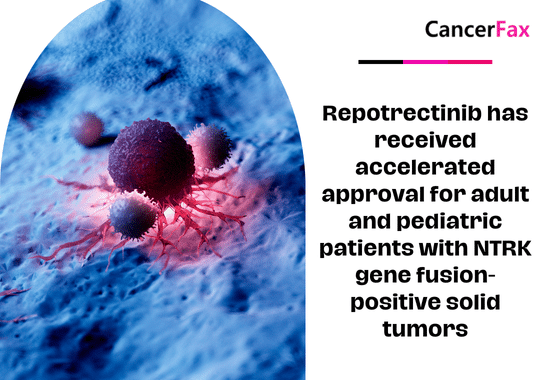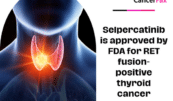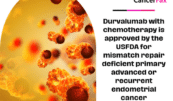Repotrectinib has received accelerated approval from the USFDA for adult and pediatric patients with NTRK gene fusion-positive solid tumors
June 2024: The Food and Drug Administration (FDA) has given accelerated approval to repotrectinib (AUGTYRO, Bristol-Myers Squibb Company) for the treatment of solid tumors in adult and pediatric patients aged 12 and above. These tumors must have a certain genetic change known as neurotrophic tyrosine receptor kinase (NTRK) gene fusion, be either locally advanced or have spread to other parts of the body, or have a high chance of serious problems happening if surgery is done. Additionally, the tumors must have shown progression after previous treatment or have no other effective treatment options available.
The effectiveness of the treatment was assessed in a clinical trial called TRIDENT-1 (NCT03093116). This trial involved 88 adult patients with advanced or spreading solid tumors that had a specific genetic mutation called NTRK gene fusion. These patients were divided into two groups: those who had previously received a TRK tyrosine kinase inhibitor (TKI) (48 patients) and those who had not received any TKI before (40 patients).
At the beginning of the study, all patients underwent an evaluation to detect any abnormalities in the central nervous system (CNS). Patients who had brain metastases with noticeable symptoms were not included in the study. Periodic evaluations of the tumor were conducted at 8-week intervals.
Overall response rate (ORR) and duration of response (DOR), based on the RECIST v1.1 criteria, were the main ways to measure how well the study worked. These were evaluated by a central review panel that was not involved with the study. The TKI-naïve group had a confirmed ORR of 58% (95% confidence interval [CI]: 41, 73), while the TKI-pretreated group had a confirmed ORR of 50% (95% CI: 35, 65).
The median duration of response (DOR) could not be estimated (NE) (95% CI: NE, NE) in the group of patients who had not received TKI treatment before, while it was 9.9 months (95% CI: 7.4, 13.0) in the group of patients who had received TKI treatment previously.
The predominant (>20%) side effects reported were dizziness, dysgeusia, peripheral neuropathy, constipation, dyspnea, fatigue, ataxia, cognitive impairment, muscle weakness, and nausea.
The suggested dosage for repotrectinib is 160 mg taken orally once a day for a duration of 14 days. Afterward, the dosage should be increased to 160 mg taken twice a day, with or without meals. This regimen should be continued until there is evidence of disease progression or the occurrence of intolerable side effects.
Susan Hau is a distinguished researcher in the field of cancer cell therapy, with a particular focus on T cell-based approaches and cancer vaccines. Her work spans several innovative treatment modalities, including CAR T-cell therapy, TIL (Tumor-Infiltrating Lymphocyte) therapy, and NK (Natural Killer) cell therapy.
Hau's expertise lies in cancer cell biology, where she has made significant contributions to understanding the complex interactions between immune cells and tumors.
Her research aims to enhance the efficacy of immunotherapies by manipulating the tumor microenvironment and exploring novel ways to activate and direct immune responses against cancer cells.
Throughout her career, Hau has collaborated with leading professors and researchers in the field of cancer treatment, both in the United States and China.
These international experiences have broadened her perspective and contributed to her innovative approach to cancer therapy development.
Hau's work is particularly focused on addressing the challenges of treating advanced and metastatic cancers. She has been involved in clinical trials evaluating the safety and efficacy of various immunotherapy approaches, including the promising Gamma Delta T cell therapy.
- Comments Closed
- June 22nd, 2024






Accelerated approval 2023, Adult cancer targeted therapy, NTRK gene fusion treatment, Pediatric solid tumor drugs, Rare cancer precision medicine, Repotrectinib FDA approval, TRK inhibitor therapy, Tropomyosin receptor kinase inhibitor
CancerFax is the most trusted online platform dedicated to connecting individuals facing advanced-stage cancer with groundbreaking cell therapies.
Send your medical reports and get a free analysis.
🌟 Join us in the fight against cancer! 🌟
Привет,
CancerFax — это самая надежная онлайн-платформа, призванная предоставить людям, столкнувшимся с раком на поздних стадиях, доступ к революционным клеточным методам лечения.
Отправьте свои медицинские заключения и получите бесплатный анализ.
🌟 Присоединяйтесь к нам в борьбе с раком! 🌟